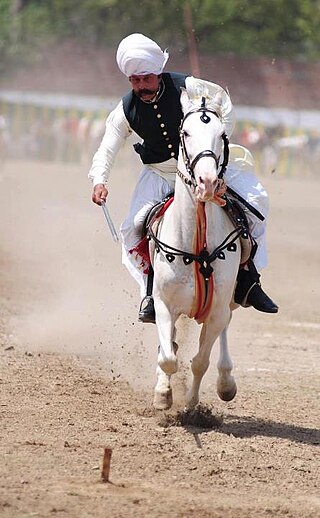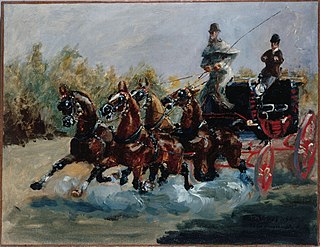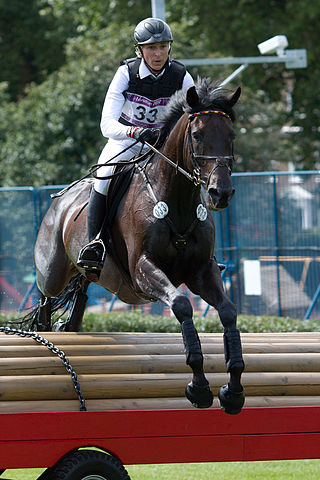Related Research Articles

Equestrianism, commonly known as horse riding or horseback riding, includes the disciplines of riding, driving, and vaulting. This broad description includes the use of horses for practical working purposes, transportation, recreational activities, artistic or cultural exercises, and competitive sport.

A horse show is a judged exhibition of horses and ponies. Many different horse breeds and equestrian disciplines hold competitions worldwide, from local to the international levels. Most horse shows run from one to three days, sometimes longer for major, all-breed events or national and international championships in a given discipline or breed. Most shows consist of a series of different performances, called classes, wherein a group of horses with similar training or characteristics compete against one another for awards and, often, prize money.
The International Federation for Equestrian Sports is the international governing body of equestrian sports. The FEI headquarters are in Lausanne, Switzerland.

Equestrian vaulting, or simply vaulting, is most often described as gymnastics and dance on horseback, which can be practiced both competitively or non-competitively. Vaulting has a history as an equestrian act at circuses, but its origins stretch back at least two-thousand years. It is open to both men and women and is one of ten equestrian disciplines recognized by the International Federation for Equestrian Sports. Therapeutic or interactive vaulting is also used as an activity for children and adults who may have balance, attention, gross motor skill or social deficits.

The United States Equestrian Federation is the national governing body for most equestrian sports in the United States. It also recruits, trains, and governs American teams in international equestrian competition at the Olympics and other competitions governed by the International Federation for Equestrian Sports (FEI).

Tent pegging is a cavalry sport of ancient origin, and is one of only ten equestrian disciplines officially recognised by the International Equestrian Federation. Used narrowly, the term refers to a specific mounted game with ground targets. More broadly, it refers to the entire class of mounted cavalry games involving pointed and edged weapons on horseback, for which the term "equestrian skill-at-arms" is also used.

Equestrianism made its Pan American Games debut at the first Pan American Games in 1951 in Buenos Aires, Argentina. It has appeared at every Pan American Games since. The current Pan American Games equestrian disciplines are Dressage, Eventing, and Jumping. In each discipline, both individual and team medals are awarded. Women and men compete together on equal terms.

Horse Sport Ireland (HSI) is the national governing body for all equestrian sport for Ireland. Established in 2008, it is responsible for the administration of international competitions throughout the island, including the Republic of Ireland and Northern Ireland. It sanctions Irish riders and horses competing abroad at international events, and implements the rules and regulations laid down by the FEI. It is recognised by FEI, Sport Ireland, and the Olympic Federation of Ireland.

Carriage driving is a form of competitive horse driving in harness in which larger two- or four-wheeled carriages are pulled by a single horse, a pair, tandem or a four-in-hand team. Prince Philip, Duke of Edinburgh helped to expand the sport. He started to compete in carriage driving in 1971, and the early rule book was drafted under his supervision.
Equestrian Canada, formerly known as Equine Canada and commonly known by its acronym, EC, is Canada’s comprehensive national governing body for equestrian sport. It is the executive branch of Canada's Olympic and Paralympic equestrian teams; the national association and registry of Canadian equestrian athletes; the national regulatory body for equestrian coaches, competition organizers, and judges; and the national federation of Canadian horse breeders and Canadian breed registries.

Hans Günter Winkler was a German show jumper. He is the only show jumper to have won five Olympic gold medals and a total of seven Olympic medals, and to compete and win medals in six different Olympic Games. In the 1950s and 1960s Winkler was one of Germany's most popular athletes.
The World Breeding Federation for Sport Horses (WBFSH) is an umbrella organisation of sport horse studbooks. It connects sport horse breeding organizations with the International Federation for Equestrian Sports (FEI). The FEI is the International Olympic Committee-recognized federation for Olympic equestrian sports. The WBFSH publishes official rankings of horses competing in international sport and also ranks the breeding organizations. Since 1992, the WBFSH has held the World Breeding Championships for Sport Horses, an international-level competition between the most promising young horses in the sports of dressage, show jumping, and eventing.

Ingrid Klimke is a German eventing rider. She appeared at five Olympics from 2000 to 2016. With her horse Abraxxas, she won two gold medals in team eventing at the 2008 Summer Olympics and the 2012 Summer Olympics. At the 2016 Summer Olympics, she won a team silver with Hale-Bob.

The CHIO Aachen is a popular international horse show held in Aachen, Germany, each summer.
Uwe Schulten-Baumer, nicknamed "Der Doktor", was a German show jumping and dressage rider who became an internationally famous dressage trainer and coach who worked with Nicole Uphoff and Isabell Werth, who won 4 and 5, respectively, Olympic gold medals in individual and team dressage.
Para-equestrian is an equestrian sport governed by the International Federation for Equestrian Sports (FEI), and includes two competitive events: One is para-equestrian dressage, which is conducted under the same basic rules as conventional dressage, but with riders divided into different competition grades based on their functional abilities. The other is para-equestrian driving, which operates under the same basic rules as combined driving but places competitors in various grades based on their functional abilities.

The Equestrian Federation of India (EFI) is the governing body for equestrian sports in India.

Equestrianism is the third most popular Olympic sport inFrance, and the leading sport for women.
References
- 1 2 3 4 5 "National Federation – Germany – (GER)" . Retrieved 14 July 2018.
- 1 2 Trosien, Gerhard, ed. (1999). Die Sportbranche: Wachstum – Wettbewerb – Wirtschaftlichkeit (in German). Campus Verlag. ISBN 978-3-59-336360-8.
- 1 2 3 "Wir über uns". Deutsche Reiterliche Vereinigung. Archived from the original on 9 February 2012. Retrieved 14 July 2018.